Orchestrating operations and technology for future success
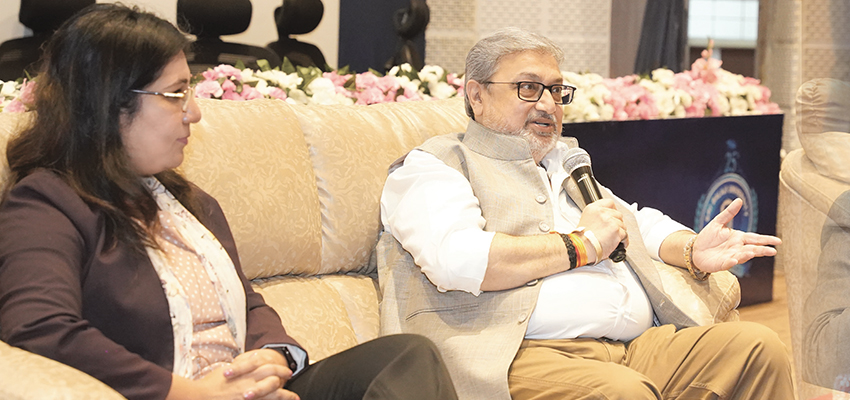
Supply chain management is essential in any business strategy for ensuring timely production of products and their delivery to customers. Deficiencies in it affects customer satisfaction. Digital transformation significantly improves a business’s efficiency by automating manual processes, reducing errors and improving productivity. In a recent panel discussion on “Navigating transformation: Orchestrating operations and technology for future success” held at Sri Balaji University, Pune (SBUP), eminent industry experts discussed the changes occurring in supply chain management and digital transformation that are affecting the industries. The panellists were Sharmishtha Niyogi, Director, supply chain, The Merck Group; Sanjeevv Khanna, COO and Vice President, Patanjali Foods Ltd; Vishal R Upadhye, Head, supply chain and manufacturing operations: South Asia, Huntsman Corporation and Varun Kakkar, General Manager, supply chain, Grasim Industries Ltd and Procyon Mukherjee, faculty, SBUP, moderated the discussion. Corporate Citizen brings you the excerpts of this discussion
Procyon Mukherjee: Take us through your experiential journey in your career across functions and different domains.
What I find something which is always relevant and valid is that you should be pro-active, you should be adaptive, and you should be always linked and connected with the market. You must be able to understand what customer wants and be immediately able to address that
-Sanjeevv Khanna
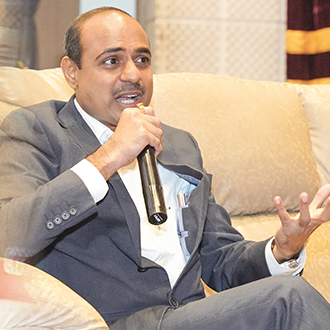
Sharmishtha Niyogi: I started my career in marketing and worked in some advertising agencies initially to understand business and then went to US. Supply chain was still evolving as a function around 2005-06. I did internship in US with retail industry, which was the time when retail industry in US was consolidating.
Later I was associated with Tata Cummins for about three years, worked with Pepsico, a FMCG industry, for about five years, followed by Rockwell and now with Merck—every time a different industry but the supply chain cuts across the industry. If we really look at the industry that has evolved and especially over last five years, supply chain has really got a seat on the table, where now supply chain strategy is part of the overall strategy of the organisation. Strategic differentiator is something that comes to my mind when I look at supply chain.
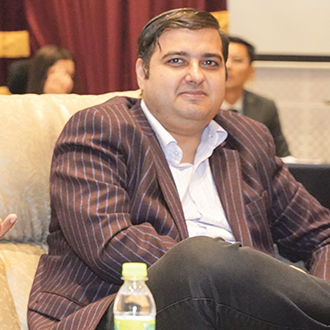
Sanjeevv Khanna: Well as far as my journey is concerned, one thing I was very clear that whatever I am going to do in my life, I am going to make an impact and I have to do that whatever way and whichever way. I was a student of Hindi medium in Uttar Pradesh(UP) during my schooling and did my post-graduation from Kurukshetra University. When I came to Punjab I found that there are students who are better than me. I decided that there are certain things which I can imbibe, which will give me my unique value proposition. And, I think we all need to identify that. As far as the subject matter expertise and skillsets are concerned, it is same for everyone and that plays only about 20 percent of the role in your professional journey and success. The other 80 percent is your attitude. Your attitude defines your altitude, so always focus on that.
I was selected in the campus interview by Honda Cars. About 36 years back, there was no supply chain function and we used to call it commercial function. During seven years in Honda, I made up my mind that if I leave this company then I will leave automobile industry itself. Later I joined Samsung Electronics, which was in the white goods sector. Supply chain runs across industries i n the same way. You only have to identify what are the similarities and what are the differences and then you address them accordingly. You have to always look for and understand your business, and provide customised solutions.
I later moved to ITC Limited and spent a decade in their lifestyle division. I moved from there to METRO Cash & Carry, a German multi-national and then to BigBasket, as the business head for northern region. For, last eight years now, I am part of Patanjali Ayurved which is now called as Patanjali Foods Limited. I am India’s first licensed IKIGAI coach. IKIGAI is finding your purpose—a Japanese life philosophy of finding the purpose of life. Why we are here? What we need to do? We all need to find where our purpose, passion and potential combine. And, that takes you to your self- maximisation—your optimum level of potential and we need to strive for that.
"In investment in technology there is gestation period. Users of the technology like us and you students need to understand and learn it, have trust in it and use it. Technology has to be evolving even if there is no disruption"
- Sharmishtha Niyogi
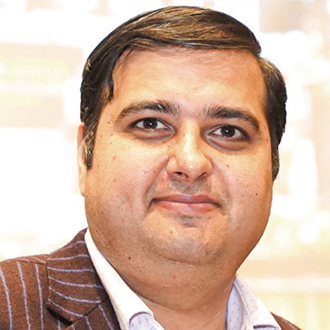
Vishal Upadhye: I did my engineering from a college in Nagpur, where I lived. If you are very clear when you find your purpose, then you can reach to new heights. I was swaying everywhere, but I found purpose later on in my life. I was not a very bright student. I used to go to college, listen to the lectures, after that never used to study properly. But somehow was able to manage third rank in the university and everyone was astonished. I got selected for Larsen and Toubro (L&T), as a site-in-charge—a very prestigious job. I missed the Tanzania project as it was not a very good place at that time to really explore. Your passion, your purpose is not very clear at that age most of the time and we get swayed everywhere.
I joined Praxair, an industrial gas manufacturing company and was posted in Jamshedpur, where they wanted to set-up a new plant. I received many promotions and there were totally seven plants under me there. I got bored so I took admission at XLRI Jamshedpur and completed my MBA. After that I joined Huntsman, where in my first job assignment I transferred the technology from Europe to India. Now, I am heading the global supply chain which includes all the end-to-end functions of supply chain - inventory, demand management, sales and operations (S&OP), logistics and everything. And, I also head the local manufacturing set-up here in South Asia.
Varun Kakkar: I am born and brought up in Delhi, in a Punjabi business family, after my father shifted there from Ferozepur in Punjab. So I did my schooling and my engineering in Delhi. After Std 11th and 12th, my teachers advised me to take up science and biology, but I was not interested in becoming a doctor.
I got into engineering at Guru Gobind Singh Indraprastha University in Delhi without too much of coaching. In my fourth year in Electronics and Communication programme, I got placed in Tata Communication Services(TCS), which was one of the biggest achievements of my life. But in my fourth year of college, I took the subject of management and organisational behaviour. I felt that it is my calling and it was something that I wanted to do in life. My parents were quite perplexed when I told them that I wanted to give CAT exam for doing MBA. They said, “You can start preparation for CAT only after you get placed.” I was slightly perplexed to know that I had got 99.95 percentile in CAT in 2007 on my first attempt.
After CAT, I went to National Institute of Industrial Engineering (NITIE), Mumbai now known as Indian Institute of Management (IIM), Mumbai. From there I got placed in Procter and Gamble (P&G), where I was taking care of their operations in Japan. Thereafter two years in India, we were taking care of the launch of their new Pampers brand. Thereafter for 10 years, I was working for Asian Paints, where for the last five years I was given the responsibility to head supply chain of their new businessm, Sleek International Pvt Ltd, which they had acquired. Later I joined Grasim Industries Ltd, as the general manager, supply chain—again I am part of their new paints project, Greenfield.
Q: As Gartner puts it, when the world got disrupted with Covid—that could be taken as a disruption—the top 25 supply chains of the world actually did better. So that’s how you create those resilient systems to do better even when you are facing disruptions. Take us through some examples in your company in Merck, across your life sciences or whatever other verticals that you can?
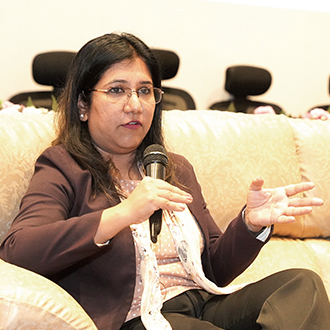
Sharmishta Niyogi: Post-Covid, the organisations and the leadership started to understand that if we don’t have supply chain in place, operations in place, we might get orders from customers but we will not be able to convert that into revenue. Because, supply chain is 50 percent of what an organisation does.
In investment in technology there is gestation period. Users of the technology like us and you students need to understand and learn it, have trust in it and use it. Technology has to be evolving even if there is no disruption. The resilience actually came from three things. First is making people agile—people who are able to manage change. Second is technology—having the latest technology or the future technology already in the portfolio of the organisation. And the third thing is the processes which will bring visibility, so that we can see the risks and take proactive steps.
Q: How would you (Sanjeevv Khanna) describe the word disruption because you would look at it very differently from others with your perspective and how do supply chains disrupt?
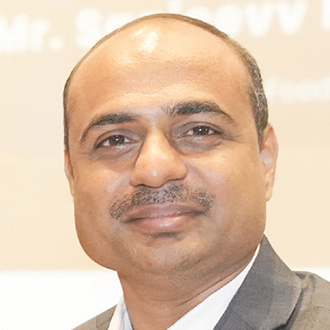
Sanjeevv Khanna: What I find something which is always relevant and valid is that you should be pro-active, you should be adaptive, and you should be always linked and connected with the market. You must be able to understand what customer wants and be immediately able to address that. Your focus should not be on disruption. Evolution is what we focus on and not revolution. So disruption happened naturally for us.
So being pro-active, adaptive and a continuous learner, in addition to knowing the customer requirement and then addressing it, is important. As long as you are doing it everything else follows. Our core value system itself had been disruption when we got into this Rashtravaad, Ayurveda and Yoga-all that brought disruption which the multi-nationals also today are following. So I think disruption is not planned. What we should focus is that we should address some of the customer requirements and you should be solving some of their problems.
Q: How would you (Sanjeevv Khanna) describe the success story of Patanjali in the context of supply chains that you have built?
Sanjeevv Khanna: In terms of supply chains, the most impactful thing that we did was being adaptive. Today we have to focus on sustainability and being eco-friendly. We have ensured that we get into the electrical vehicles as far as possible for the distribution, to make it much greener. We have adopted packaging that is more environment-friendly which is recyclable and reusable. We are minimising inventory levels and giving quick response to our orders. Basically one important thing that we have done is that we are not focusing only on basic data analytics. We are focusing on predictive analytics or prescriptive analytics. Today from basic data analytics we are moving to predictive analytics and prescriptive analytics. Data is available, so we are taking more informed and better analysed decision.
Q: Around the transformation of the supply chains at Huntsman and pre-covid to post-covid all the current influences that we see around us—how have you embraced them and leveraged them?

Vishal Upadhye: Every organisation always has some or the other transformations going on that we call basically as incremental improvement or incremental transformation. Only thing is that major disruptions like Covid teach us something that incremental things may not be incremental for a longer time. Either you innovate or you die. Covid and these kinds of disruptions have really taught us that very well.
I will categorise the Huntsman supply chain into three categories - one is manufacturing, second is procurement and third is delivery. Every part of this supply chain has taken a different role or a different stance to choose the path of transformation post-Covid. The manufacturing understood that basically relying on the one centralised manufacturing location may not be really helpful. But, now we need to think something different and no incremental benefit can be there. So technology transformation began and is on a very high speed now.
The second part of it is the procurement part. We always say that basically your business is as good as you know your customer very well. But, most of the time businesses forget that your business is also as good as you know your supplier very well. But most of the times what happened was that those suppliers got neglected or taken as granted. Then Covid wave occurred and one ship got stuck in Suez Canal. It taught us that procurement cannot be only local, it can be global. But at the same time can you find out some substitute for some of your chemicals, products or services which can act as an alternative? Transformation came very handy for that.
Third is definitely the delivery part. Today, the most neglected entity or a part in the entire supply chain is the customer. We always say ‘Customer is King’ or ‘Customer is God’ and we sometimes say ‘Customer is Everything’. But believe me, customer is neither King nor God, because sometimes God forgives you for some of your mistakes but customers don’t forgive you. We learnt this during Covid or post-Covid period. We got some new customers, we lost some old loyal customers. That taught us a lot.
Predictive and prescriptive analysis really helped. It is useful when data is correct. Unless and until your data is properly managed, your master data is most of the time like garbage in and garbage out. If your master data is not properly managed in the system, then your entire analysis goes for a toss. And that’s what actually was when the transformation journey began with the data management first. Every day zillions of bytes of data we generate but do we really have that capability to understand that data, to modify the data which can give real significant structure to take proper decision? That’s what the transformation on technology front taught us.
"Innovation or technology is not something to be blindly followed but rather it is intelligently using those as tools to make your supply chain and your business more efficient and cost-effective"
-Sanjeevv Khanna
"Only thing is that major disruptions like Covid teach us something that incremental things may not be incremental for a longer time. Either you innovate or you die."
-Vishal Upadhye
Q: Can you (Varun Kakkar) take us through your specific supply chain transformation and some of the disruptions that you saw in the paint industry and talk about Asian Paints.
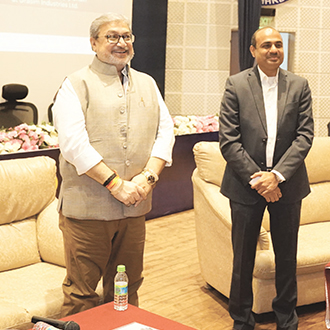
Varun Kakkar: In 2000, Asian Paints became one of the first companies to start using supply chain software, especially use of automation in demand planning became a focus. In Asian Paints the focus was not only on the dealers to whom we are selling but on what they are buying. We also focus on what the end customer is also buying. If you don’t have visibility on what is happening on your suppliers and your customers end—in case of any disruption which obviously happened during Covid time, you are going to take a bigger hit. Again the focus in Asian Paints was always on how can we get more and more people in, towards supply chain? For that during 2015-18, focus was making visible to us what the suppliers are doing.
That is back-end integration. In the front-end integration, focus in Asian Paints, again was there on what end customers are buying? We want to know that because that is the final trend and that is how it is going to play out. You should be close to the customer and that is how it is playing out for India. Many companies are coming to India, why? Because they don’t want to have one company supply chain.
Q: What could be some of those examples that you can give in the area of innovation and use of technology?
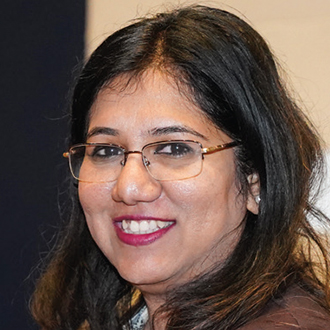
Sharmishtha Niyogi: Use of technology is the future of supply chain. In supply chain we know the distributors, vendors. Now we will have to become efficient but we also have to be ready for and have resilience to manage these kinds of disruptions. I have worked with organisations like Merck and Pepsico, that have supply chain as part of the strategy. They are looking at bringing all the technologies, the AIs and everything, and they are looking for people who can manage, who can trust technology and who can manoeuvre situations and take insights from what technology is giving us. The focus is no more on supply chain. We are not anymore dazzled by manufacturing units and optimising it, technology and AI and all these things. They are all a state of tomorrow.
What we are now working with is what does the technology give us? We are sitting on humungous amount of data. Supply chain is the one function that creates a lot of data and that actually impacts the entire organisation. Finance and sales team are also dependent on this data. If supply chain team is able to get that data and inferences through the technology, then we need people like you students who are going to be in the industry very soon, who can use that technology and the data and inferences that are coming from that technology in a right manner.
Q: When you look at your competitors– whether Hindustan Lever or Colgate Palmolive or Dabur, they have pretty good supply chains and have decades of experience and you come much later on. So how do you innovate and still be competitive with them?
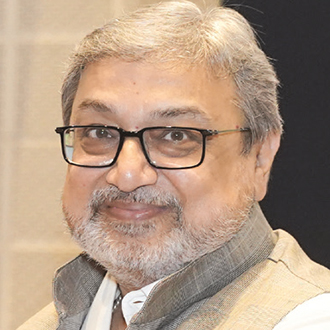
Sanjeevv Khanna: Just by being intelligent and observant. Technology and innovations are all tools. We should know how to use them. Everywhere we don’t have to use technology, because it is available. It exists, we are aware of it. Just to showcase our knowledge.
Innovation or technology is not something to be blindly followed but rather it is intelligently using those as tools to make your supply chain and your business more efficient and cost-effective.
So time-efficient and cost-effective are the two core pillars of business. As long as that is being achieved, everything else is fine. Because technology will keep coming and keep changing. We need to ensure that we need to use it effectively and become that much more productive.
"Digitisation should not lead to more complex thing being happening. Digitisation is a way of making your process digital. The process should be simple enough so that you should be able to explain it to 10th class grader"
- Varun Kakkar
Q: One of the verticals you (Vishal Upadhye) have is advanced materials, that’s something for the future. I think EV batteries and all would be connected. So, how do you see that part developing? It’s a critical challenge for the world today to develop the supply chains and how do you see that unfurling?
Vishal Upadhye: It is a little confidential so I will give a major overview without revealing the confidential information. Technology and evolution are taking leaps and bounds in many fields. Whether it is EV batteries or even the cables which get connected to the EV battery and motor, those also need to get insulated in a proper way to prevent mishaps.

We have many different products which not only goes into the batteries for the automobile but also many parts of the aeroplane. We supply to the Boeing and Airbus which is an elite business for Huntsman. We do have radical and technological innovations into all these fields. When I say radical because, it is not that we make improvements in one product every year, sometimes we completely scrap the product and bring something new.
But, when all these innovations happen on R&D and technological front, there is an entire machinery which works in the background, which is not visible. I will say, sometimes people say that supply chain is not visible, which is the most thankless job at point of time because that is not visible. Ultimately at the end of the day, the supply chain is the only pillar which actually makes all these things happen. Bringing all the different technologies, raw materials from different sources, making it possible what the scientists want and also at the same time giving it to the customer for trials and making it happen.
Q: The question is on digitisation of supply chains. How do you take that examples from the paint industry or any other industry and how successful implementation of digitisation could be a lever for these industries?
Varun Kakkar: Digitisation now has become a very essential part of all the businesses. Everybody is doing it. For the new company of Grasim, we are in discussion with all the new vendors. All of them are working. In the industry we do not have enough people to do digitisation. We have to first focus on keeping things simple. Digitisation should not lead to more complex things. Digitisation is a way of making your process digital. The process should be simple enough so that you should be able to explain it to 10th class grader. Once you do that then you do all the digitalisation. Once you do digitalisation there is a specific focus decided and that is going to give results.